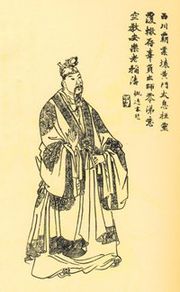
Back ليو شان ARZ Lyu Şan Azerbaijani Liu Shan Catalan لیو شان CKB Liu Shan German لیو شان Persian Liu Shan French Liu Shan ID 劉禅 Japanese 유선 (촉한) Korean
This article has multiple issues. Please help improve it or discuss these issues on the talk page. (Learn how and when to remove these template messages)
|
| Liu Shan 劉禪 | |||||||||||||
|---|---|---|---|---|---|---|---|---|---|---|---|---|---|
 A Qing dynasty illustration of Liu Shan | |||||||||||||
| Emperor of Shu Han | |||||||||||||
| Reign | June 223 – December 263 | ||||||||||||
| Predecessor | Liu Bei | ||||||||||||
| Regent | |||||||||||||
| Crown Prince of Shu Han | |||||||||||||
| Tenure | 19 June 221 – June 223 | ||||||||||||
| Successor | Liu Xuan | ||||||||||||
| Duke of Anle (安樂公) | |||||||||||||
| Tenure | 264–271 | ||||||||||||
| Born | 207 Xinye County, Henan | ||||||||||||
| Died | 271 (aged 64) Luoyang, Henan | ||||||||||||
| Spouse |
| ||||||||||||
| Issue Detail |
| ||||||||||||
| |||||||||||||
| House | House of Liu | ||||||||||||
| Dynasty | Shu Han | ||||||||||||
| Father | Liu Bei | ||||||||||||
| Mother | Empress Zhaolie | ||||||||||||
| Liu Shan | |||||||||
|---|---|---|---|---|---|---|---|---|---|
| Traditional Chinese | 劉禪 | ||||||||
| Simplified Chinese | 刘禅 | ||||||||
| |||||||||
Liu Shan (, 207–271),[1][a] courtesy name Gongsi, was the second and last emperor of the state of Shu Han during the Three Kingdoms period. As he ascended the throne at the age of 16, Liu Shan was entrusted to the care of the Chancellor Zhuge Liang and Imperial Secretariat Li Yan. His reign of 40 years was the longest of all emperors in the Three Kingdoms era.[b] During Liu Shan's reign, many campaigns were led against the rival state of Cao Wei, primarily by Zhuge Liang and his successor Jiang Wei, but to little avail, due to their drastic mismatch in terms of population and geographic extent. Liu Shan eventually surrendered to Wei in 263 after Deng Ai led a surprise attack on the Shu capital Chengdu. He was quickly relocated to the Wei capital at Luoyang, and enfeoffed as "Duke Anle". There he enjoyed his last years peacefully before dying in 271, most probably of natural causes.
Widely known to later generations by his infant name "Adou" (阿斗), Liu Shan was commonly perceived as an incapable ruler. He was also accused of indulging in pleasures while neglecting state affairs, allowing corrupt officials to take power. Some modern scholars have taken a more positive view towards Liu Shan's capability, as Liu Shan's long reign in Shu Han was free of bloody court coups unlike its rivals. Nevertheless, the name "Adou" is today still commonly used in Chinese as an epithet for someone so incompetent at a task that no amount of assistance will help them succeed.[2]: 59 n. 2
The main source of historical information about Liu Shan and his contemporaries is Records of the Three Kingdoms. Its author Chen Shou noted in his postface that Zhuge Liang did not employ scribes at Liu Shan's court, contrary to tradition.[3] This custom would never be established in Shu Han, so details of Liu Shan's rule are hazy in comparison to the richness of information available for Shu's rival states of Wei and Wu. Much of his reign is recorded in spare, terse synopsis.[4]
- ^ de Crespigny (2007), p. 541.
- ^ Hu Shih (2022) [1934]. "Do We Need Or Want Dictatorship?". In Chou, Chih-p’ing; Lin, Carlos Yu-Kai (eds.). Power of Freedom: Hu Shih's Political Writings. China Understandings Today. University of Michigan Press. pp. 55–61. doi:10.3998/mpub.12258711. JSTOR 10.3998/mpub.12258711.5.
- ^ Chen and Pei (429), p. i.
- ^ Chen and Pei (429), 33.896–899.
Cite error: There are <ref group=lower-alpha> tags or {{efn}} templates on this page, but the references will not show without a {{reflist|group=lower-alpha}} template or {{notelist}} template (see the help page).
© MMXXIII Rich X Search. We shall prevail. All rights reserved. Rich X Search